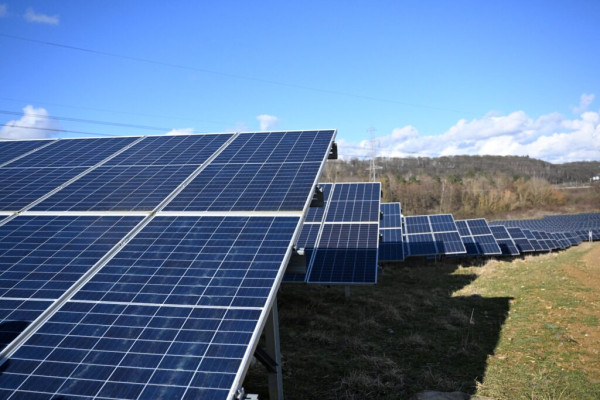EU snubs dying solar manufacturers as China poised to swallow market
BRUSSELS — Europe’s solar producers are hurtling towards extinction after the European Union hinted Tuesday that it wouldn’t bail out ailing manufacturers, according to a person familiar with closed-door talks — a move that puts thousands of jobs at risk and deals a blow to the bloc’s cleantech ambitions.
EU solar manufacturers have warned for months that they face an existential crisis with respect to China’s near-total dominance over global supply lines, which has caused a supply glut of dirt-cheap solar panels inside the bloc and left them unable to compete. In the coming week, companies are set to begin laying off the roughly 4,000 skilled workers in the sector.
But in a private meeting between the solar industry and the European Commission on Tuesday, the bloc's competition officials said they wouldn’t change subsidy rules to support the industry without a strong push from the EU governments, according to the person familiar with the talks, who was granted anonymity to speak freely about confidential talks.
The development comes as Brussels scrambles to establish itself as a global player in clean technologies like hydrogen, batteries and wind power in a race against Beijing and Washington, two countries that have poured hundreds of billions of state subsidies into their green industries.
At the same time, the EU wants to reduce its dependence on China by ramping up solar manufacturing capacity to 30 gigawatts by 2030 as the bloc aims to become carbon neutral by the middle of the century. After losing much of its solar sector to the country a decade ago, the EU now relies on Beijing for more than 80 percent of its solar imports.
Last month, 12 firms representing three-quarters of the bloc's solar module production capacity issued a final plea to the Commission asking for tweaks to Brussels’ state aid rules that would unlock subsidies equivalent to €880 million over the next two years. Those include a buyout of stocks and help with their operational expenditures.
“In March, we will be forced to make a difficult decision to fully close these [photovoltaic] module manufacturing facilities … if there are no major changes in the market and no emergency support decisions,” read the letter, seen by POLITICO.
Now, that wave of shutdowns is beginning.
On Tuesday, Germany’s largest solar manufacturer, Meyer Burger, produced its last module, a spokesperson for the company told POLITICO, after a lack of public support from Brussels and Berlin. The company will start laying off its 500 workers “in the next few days,” the spokesperson added.
By next week, companies will shutter production lines equivalent to a fifth of the EU’s total module capacity, according to Johan Lindahl, secretary general of the European Solar Manufacturing Council lobby.
“It’s very dire,” he said. If the closures go ahead as expected, “China would have the possibility to control the energy transition of Europe.”
Sunny side down
Still, the EU insists it’s already doing what it can to help the sector.

As part of its effort to turbocharge investment in clean technologies, the Commission last year proposed tweaks to its state aid rules until 2025 “enabling investment support for the manufacturing of strategic equipment, including solar panels,” a spokesperson for the institution told POLITICO.
The EU executive also said Tuesday’s meeting was “an exchange of views where no official position of the Commission was expressed,” while insisting that EU subsidies for operating costs are “highly exceptional” since this is “highly distortive” for the bloc’s single market.
At the same time, EU energy chief Kadri Simson last week vowed to produce a “solar power pledge” in the coming weeks that would lay out options EU governments and companies can take to support solar production in the bloc after a regular meeting of EU energy ministers in Brussels.
In a letter sent to the bloc’s countries before the summit, the Commission suggested countries set up state-led solar project auctions that favor local manufacturers and said it would “explore” how to use existing EU funds to “leverage private finance.”
But for the industry, it is too little, too late.
“It doesn't really address the situation that we see in the next month,” said Lindahl, the lobbyist, adding that EU countries must now “put pressure on the Commission” to dole out support for operating costs.
While capitals have largely remained silent so far, energy ministers from 10 EU countries including Cyprus and Lithuania were supportive of immediate measures for solar producers during a closed-door lunch at the same meeting last week, according to two EU diplomats granted anonymity to talk about confidential discussions, and the person familiar with Tuesday's talks.
“We need to find funds,” agreed a third EU diplomat, adding that “obviously [we] need subsidies” if the bloc wants to keep its industry alive.
But whether that investment actually makes sense is an open question, according to Jenny Chase, a senior solar analyst at BloombergNEF.
If China does cut off solar exports to the EU, the bloc can swap in imports from the U.S. and India, she said. EU governments could also revive their module manufacturing industry faster than the 25 years it typically takes for solar panels' warranties to expire in a worst-case scenario.
“If Europe wants to keep making solar modules, then it does need some kind of [operating] support,” she said, but “I would question whether that is an advisable goal.”